Higashiyama (center)
Higashiyama is a fairly large district of the city of Kyoto.
This page is dedicated to the
central area of Higashiyama, which also includes the popular area of
Gion, that you can deepen in
this page.
For the southern part of the district, see
Higashiyama (southern).
The neighborhood
In this area of Higashiyama there is one of the most famous temples in all of Japan, the
Kiyomizu-dera (see below). The narrow streets that from this temple lead up to the
Maruyama Park are one of the "preserved historic districts" of the city, with preserved traditional buildings that now house hundreds of restaurants and shops.
This area is one of the most fascinating of Kyoto.
Kiyomizudera Temple
(admission 300 yen, opening hours 6:00-18:00)
Maybe it is my favourite temple famous temple of Kyoto.
This temple was founded way back in 798, and the current buildings date back to 1633.
The temple is located on a hill about 11 meters high, surrounded by cherry and maple trees that make this place incredibly spectacular in autumn and spring, when the grounds are open also in the evening, since they're adorned with a wonderful lighting (from mid-March to mid-April, from mid-November to early December).
The most famous place of the temple is its terrace, veranda, which overlooks the area below, and in the distance you can enjoy a view of the city of Kyoto, from this place you can admire one of the most famous views of all Japan.
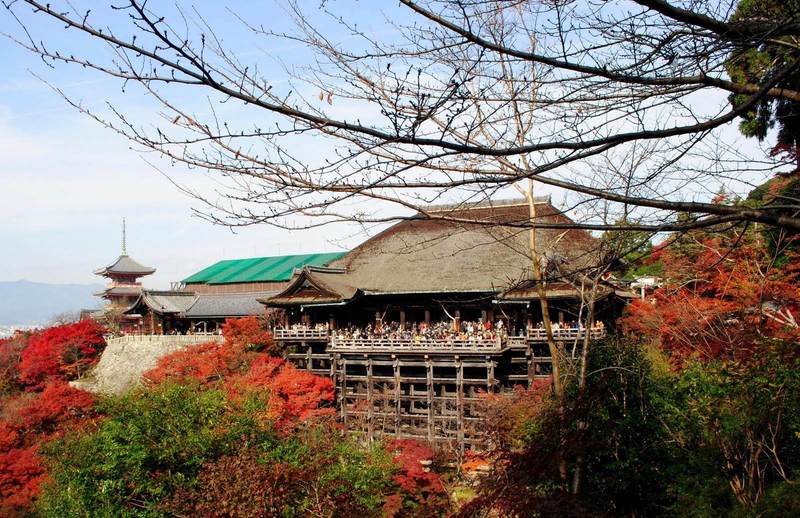 the Kiyomizudera seen frontally
the Kiyomizudera seen frontally
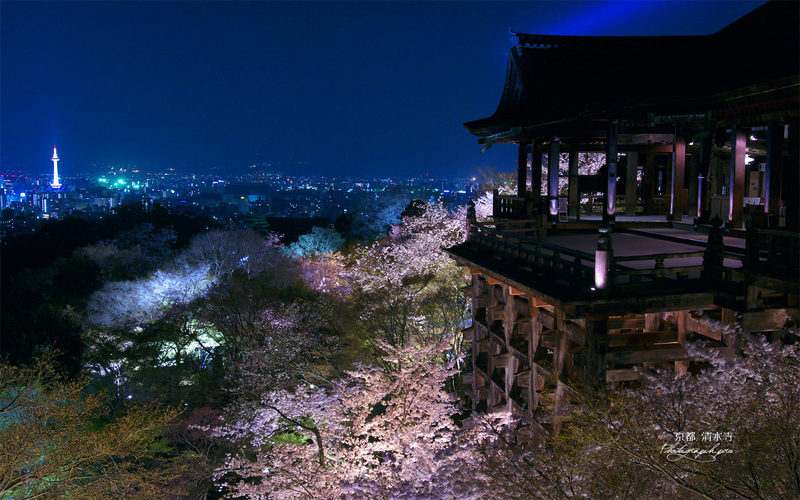 one of the most famous views in Japan: Kyoto seen from the illuminated Kiyomizudera during the cherry blossom (photo taken from photograph.pro)
one of the most famous views in Japan: Kyoto seen from the illuminated Kiyomizudera during the cherry blossom (photo taken from photograph.pro)
Yasaka Pagoda (Hokanji Temple)
(admission 400 yen, opening hours 10:00-16:00)
A 5-story pagoda that is located on the road between the Kyomizudera and Maruyama Park, belonging to a temple which no longer exists, the
Hokanji Temple.
It gives an even more "magic" touch to the area, and you can visit it also inside (a rare opportunity, the pagodas of the temples are usually closed to the public).
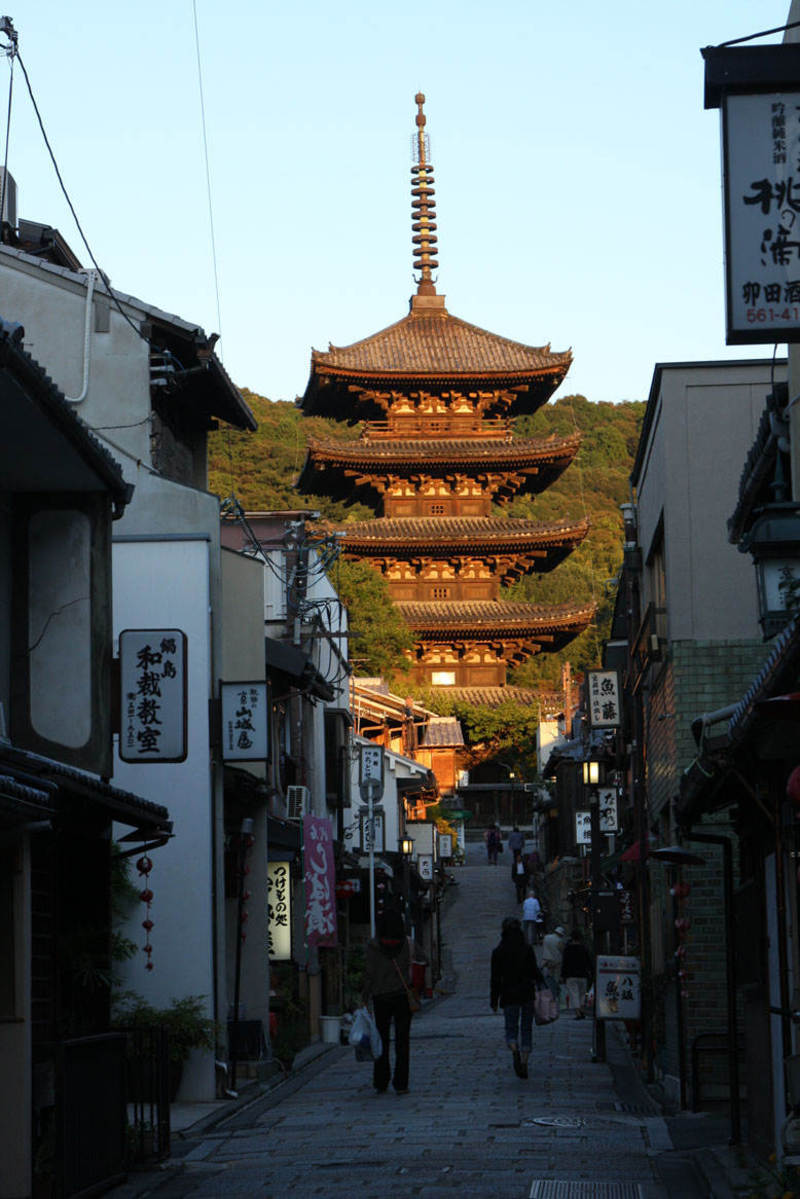 the pagoda that rises in the middle of the streets of Higashiyama (photo taken by cronyogitect)
the pagoda that rises in the middle of the streets of Higashiyama (photo taken by cronyogitect)
Kodaiji Temple
(admission 600 yen, opening hours 9:00-17:30)
A Zen Buddhist temple, belonging to the Rinzai sect. It is located on the road between the Kiyomizudera and Maruyama Park.
Like any Zen temple, this is also surrounded by beautiful gardens, including a rock garden. In the surroundings of the temple there is also a bamboo grove and two tea-houses, one of which was designed by one of the greatest masters of the tea ceremony in Japanese history, Sen no Rikyu.
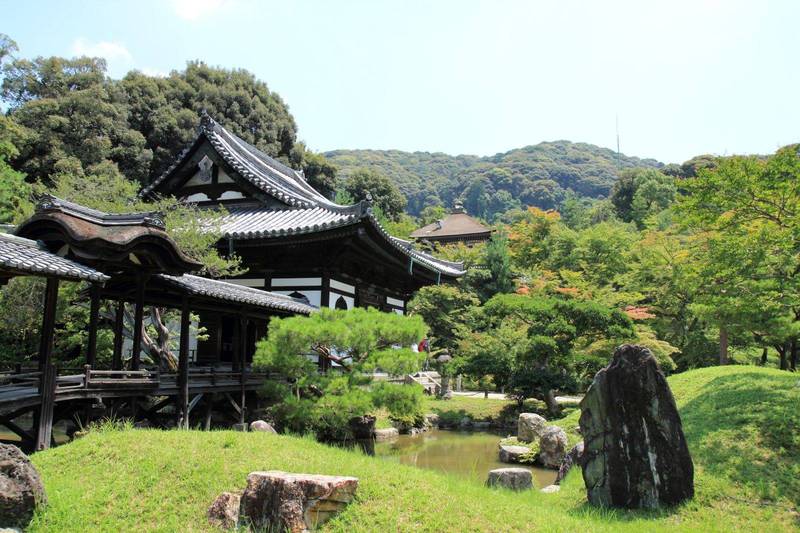 view from inside the Kodaiji Temple
view from inside the Kodaiji Temple
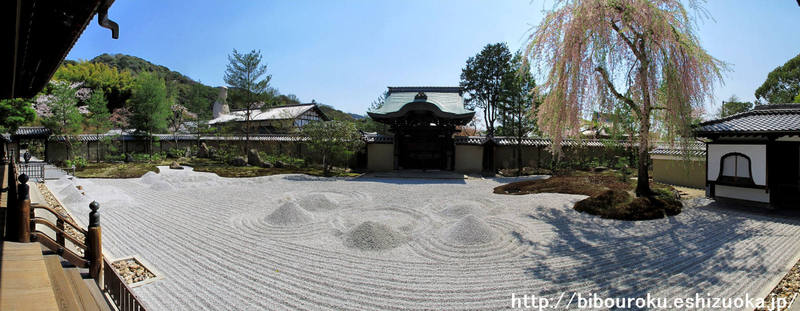 Kodaiji's rock garden (photo taken by bibouroku)
Kodaiji's rock garden (photo taken by bibouroku)
Maruyama Koen (Maruyama Park)
A public park with free admission, always open, famous for its cherry trees, so it's very popular especially in April during the blossoming period.
To the east, next to the park, there is the famous
Yasaka shrine, about which you can read the dedicated paragraph on the guide of
Gion.
Walking to the north there are instead two other temples, the
Chionin and the
Shorenin.
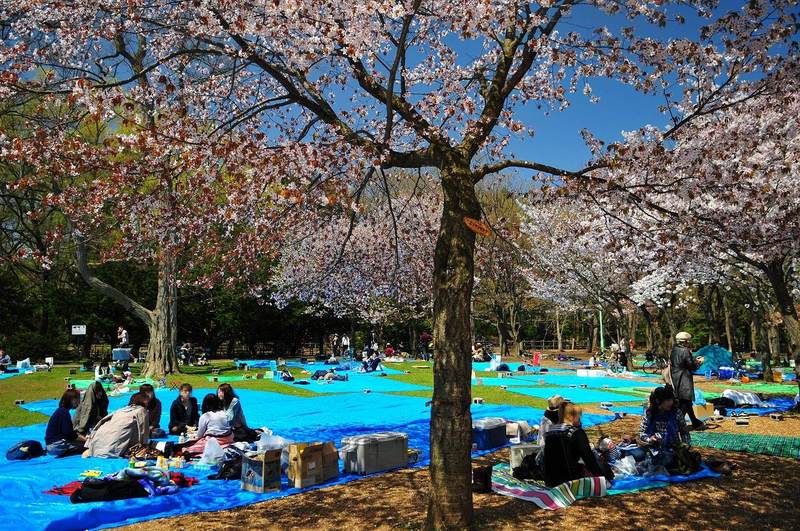 picnics under the trees in Maruyama Park
picnics under the trees in Maruyama Park
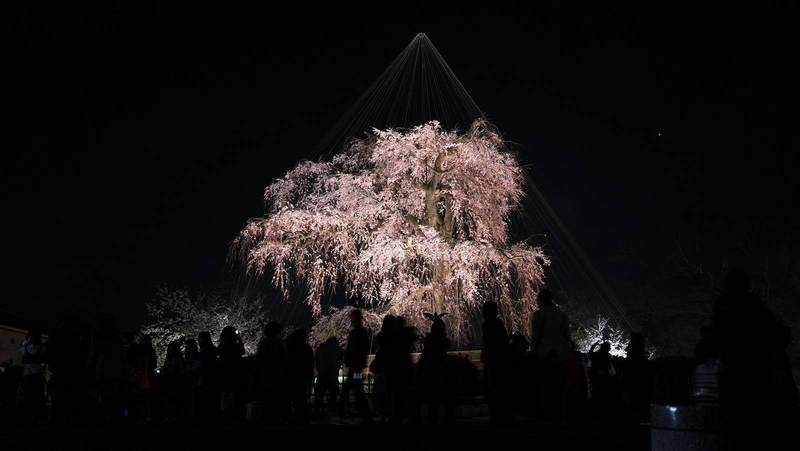 the "star" of the park during the cherry blossom: a spectacularly illuminated shidarezakura (weeping cherry)
the "star" of the park during the cherry blossom: a spectacularly illuminated shidarezakura (weeping cherry)
Chionin Temple
(free admission, always open, the interior of buildings 9:00-16:00 )
The main temple of the Jodo sect of Buddhism.
The main entrance gate (Sanmon Gate) is the biggest of all Japan (24x50 meters, built in 1619).
Inside the main building (
Miedo Hall) a statue of the founder of the Jodo sect, Honen, is housed.
Inside the temple there are two zen gardens, each with separate admission, the
Hojo Garden and the
Yuzen Garden (combined admission 500 YEN), the gardens are obviously very beautiful, but like all Zen gardens. If you have already seen a few of them I advise you to avoid spending more money.
Following the paths that climb up the hill behind the temple, you will find many other small buddhist buildings, and the atmosphere is very charming.
Shorenin Temple
(admission 500 yen, opening hours 9:00-17:00)
A Buddhist temple of the Tendai sect, certainly less famous than other sacred places in the area.
The most interesting place of this temple, as well as the beautiful gardens that surround it (four gardens), is the
Kacho-den building, inside which the doors are painted with floral motifs created by the artist
Kimura Hideki, and from where you can enjoy a "meditative view" over the gardens sipping a cup of tea.
In autumn and spring special lightings are installed also in this temple (as is happens at the much more famous Kiyomizudera Temple), at
this link you can find further information.
On March 21, May 5 and throughout the month of November, you can participate in tea ceremonies (they cost 1000 YEN) inside the teahouse of the temple (
Kobun-tei), further information
here.
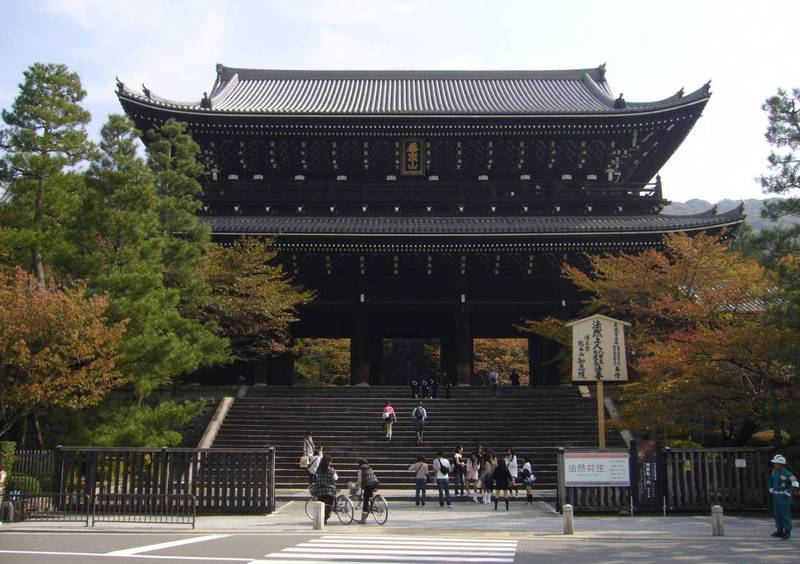
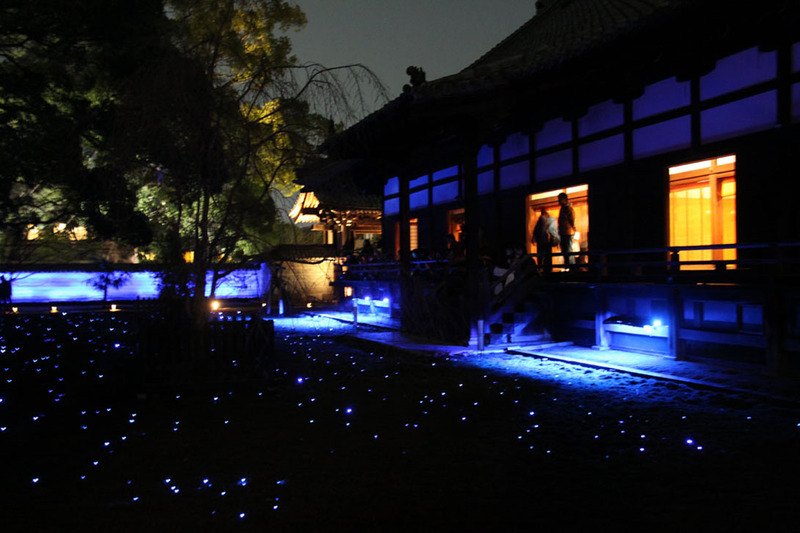 Sanmon Gate of the Chionin Temple (on the left) and lightened Shorenin Temple (on the right)
Sanmon Gate of the Chionin Temple (on the left) and lightened Shorenin Temple (on the right)
Sleeping, where to stay in Higashiyama
A few minutes walk from Kiyomizudera, hidden along a small street, you can find the
Guest House Yamato, a small, family-run guest house with good prices.
For other recommended hotels nearby, you can refer to the "Sleep" paragraph in the guide of
Gion.
Pratical guide, how to get to Higashiyama and map
The best way to reach the Kiyomizudera, from where I suggest to start your itinerary and then going up towards the Maruyama Park and the Gion area, is the bus: from
Kyoto station you can take the line
number 100 or the
206 getting of at "
Kiyomizumichi" stop.
You can also reach this part of Higashiyama on foot from
Gion area.
Higashiyama station, served by the
Tozai line of the metro (Kyoto Municipal Subway), is located in a bit inconvenient position, about 600 meters north-west of the Temple Shorenin, which in turn is located 2 km away from Kiyomizudera.
Guided tours, activities and other things to do
If you are planning a trip to Japan and you want to do something more than just visiting famous places and monuments, we suggest you to use
Rakuten Travel Experiences.
How to use Rakuten Travel Experiences
Rakuten Travel is a very useful website to
enrich your travel experience, especially if you are going solo or it's your first time in Japan.
Because of the language barrier (and more), in Japan it is very difficult to interact with the locals and to get off the tourist track.
Thanks to Rakuten Travel you can find a lot of interesting and sometimes unique
guided tours and activities all over Japan (and not only in Japan), that you would otherwise never be able to enjoy.
But there's more: on Rakuten Travel you can also
buy tickets for several famous attractions, events, transportation and other useful services for tourists. Last but not least, you can
reserve a table in hundreds of restaurants.
Some examples
Take a look at Rakuten Travel Experiences
You may also be interested in
 one of the most famous views in Japan: Kyoto seen from the illuminated Kiyomizudera during the cherry blossom (photo taken from photograph.pro)
one of the most famous views in Japan: Kyoto seen from the illuminated Kiyomizudera during the cherry blossom (photo taken from photograph.pro)
 the pagoda that rises in the middle of the streets of Higashiyama (photo taken by cronyogitect)
the pagoda that rises in the middle of the streets of Higashiyama (photo taken by cronyogitect)
 Kodaiji's rock garden (photo taken by bibouroku)
Kodaiji's rock garden (photo taken by bibouroku)
 the "star" of the park during the cherry blossom: a spectacularly illuminated shidarezakura (weeping cherry)
the "star" of the park during the cherry blossom: a spectacularly illuminated shidarezakura (weeping cherry)